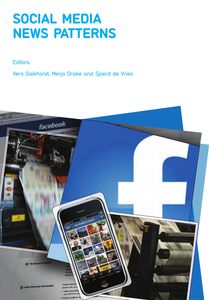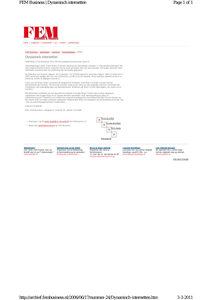Conference abstract and presentation of research to voluntary sports clubs and virtual community building through social networking sites.
DOCUMENT

Steeds meer ouderen lijken te worstelen met de integratie van twee aparte werelden, de echte en de virtuele, want zij zien de voordelen van nieuwe communicatiemiddelen en willen de aansluiting met de moderne wereld niet missen. Hedendaagse jongeren staan anders in het leven: voor hen is er maar één wereld. Technologie is zo vanzelfsprekend dat ze helemaal niet meer zien waar ICT een rol speelt en waar niet. Het is er ‘gewoon’ en als het leuk of nuttig is moet je het gebruiken. Het internet en mobiele apparaten zijn alleen maar hulpmiddelen om je zo goed mogelijk te informeren, om te communiceren, te netwerken en je te vermaken.
DOCUMENT

Social media platforms such as Facebook, YouTube, and Twitter have millions of users logging in every day, using these platforms for commu nication, entertainment, and news consumption. These platforms adopt rules that determine how users communicate and thereby limit and shape public discourse.2 Platforms need to deal with large amounts of data generated every day. For example, as of October 2021, 4.55 billion social media users were ac tive on an average number of 6.7 platforms used each month per internet user.3 As a result, platforms were compelled to develop governance models and content moderation systems to deal with harmful and undesirable content, including disinformation. In this study: • ‘Content governance’ is defined as a set of processes, procedures, and systems that determine how a given platform plans, publishes, moder ates, and curates content. • ‘Content moderation’ is the organised practice of a social media plat form of pre-screening, removing, or labelling undesirable content to reduce the damage that inappropriate content can cause.
MULTIFILE

Firms increasingly use social network sites to reach out to customers and proactively intervene with observed consumer messages. Despite intentions to enhance customer satisfaction by extending customer service, sometimes these interventions are received negatively by consumers. We draw on privacy regulation theory to theorize how proactive customer service interventions with consumer messages on social network sites may evoke feelings of privacy infringement. Subsequently we use privacy calculus theory to propose how these perceptions of privacy infringement, together with the perceived usefulness of the intervention, in turn drive customer satisfaction. In two experiments, we find that feelings of privacy infringement associated with proactive interventions may explain why only reactive interventions enhance customer satisfaction. Moreover, we find that customer satisfaction can be modeled through the calculus of the perceived usefulness and feelings of privacy infringement associated with an intervention. These findings contribute to a better understanding of the impact of privacy concerns on consumer behavior in the context of firm–consumer interactions on social network sites, extend the applicability of privacy calculus theory, and contribute to complaint and compliment management literature. To practitioners, our findings demonstrate that feelings of privacy are an element to consider when handling consumer messages on social media, but also that privacy concerns may be overcome if an intervention is perceived as useful enough.
MULTIFILE

Hoofdstuk 2 gaat over peer en professionele online support voor ouders bij het opvoeden. In totaal bevat het boek 31 hoofdstukken over sociaal netwerken, geschreven door tientallen onderzoekers wereldwijd.
MULTIFILE

On the internet we see a continuously growing generation of web applications enabling anyone to create and publish online content in a simple way, to link content and to share it with others: wellknown instances include MySpace, Facebook, YouTube, Flickr, Wikipedia and Google Earth. The internet has become a social software platform sailing under the Web 2.0 flag, creating revolutionary changes along the way: the individual, the end-user, comes first and can benefit optimally from an environment which has the following keywords: radically user-oriented, decentralized, collective and massive. ‘An environment in which each participant not only listens, but can also make his own voice heard’: the Social Web. This document describes a brief exploration of this Social Web and intends to gain insight in possible fundamental changes this phenomenon is causing or might cause in our society. Particular attention will be paid to the impact of the Social Web on learning and education. For how do two apparently contrary developments touch and overlap? On the one side we have the rapid growth of technologies bringing individuals together to communicate, collaborate, have fun and acquire knowledge (social software). And on the other hand we have the just conviction within the world of education that young people should not only acquire knowledge and information, but should also have all kinds of skills and experience in order to meet social and technological changes deliberately, and prepare for a life long of learning.
DOCUMENT

Wereldwijd onderzoek: Hoe gebruiken nieuwsmedia social media? Jongeren lezen geen krant meer, ze kijken op hun smartphone die ze altijd bij de hand hebben. Binnen het lectoraat social media en reputatiemanagement van NHL hogeschool te Leeuwarden heeft een groep internationale studenten in 12 landen onderzoek gedaan. Hierbij hebben ze meer dan 150 social media sites bestudeerd van nieuws media. De resultaten maken deel uit van een internationaal onderzoek van NHL Hogeschool en Haaga Helia University. De onderzoeksvraag was: Wat speelt zich af in de nieuwsmedia? Persbureaus kunnen het overzicht gebruiken om hun social media te optimaliseren. En voor ieder die journalistiek een warm hart toedraagt is het interessante informatie over de nieuwsmedia in een overgangssituatie (2nd edition)
DOCUMENT

BACKGROUND: Loneliness is expected to become an even bigger social problem in the upcoming decades, because of the growing number of older adults. It has been argued that the use of social network sites can aid in decreasing loneliness and improving mental health. The purpose of this study was to examine whether and how social network sites usage is related to loneliness and mental health in community-dwelling older adults. METHOD: The study population included community-dwelling older adults aged 60 and over residing in the Netherlands (n = 626) collected through the LISS panel (www.lissdata.nl). Univariate and multivariate linear regression analyses, adjusted for potentially important confounders, were conducted in order to investigate the relation between social network sites usage and (emotional and social) loneliness and mental health. RESULTS: More than half of the individuals (56.2%) reported to use social network sites at least several times per week. Social network sites usage appeared unrelated to loneliness in general, and to emotional and social loneliness in particular. Social network sites usage also appeared unrelated to mental health. Several significant associations between related factors and the outcomes at hand were detected. CONCLUSION: In this sample, which was representative for the Dutch population, social network sites usage was unrelated to loneliness and/or mental health. The results indicate that a simple association between social network site usage and loneliness and mental health as such, cannot automatically be assumed in community-dwelling older adults.
LINK
This paper reports on the EU-project 'Professionally Networking Education and Teacher Training' (PRONETT). The key objective of the PRONETT project (2001-2004) is to develop a regional and cross national learning community of pre- and in-service teachers and teacher educators supported by webbased resources and tools to collaborate and to construct shared understandings of teaching and learning in a networked classroom. The reasons for the initiative and the design principles of the PRONETT portal offering a virtual infrastructure for the collaboration of participating students and teachers at www.PRONETT.org are presented. The initial pilots carried out by the project partners are described, highlighting the co-ordinating partners activities targeted at contributing to the local realisation of ICT-rich, competence based Teacher Education Provision. Results are reported of the evaluation and implementation efforts aimed at validating the original portal design and collecting information to inspire further project development and implementation strategies. We conclude by summarising the lessons learned and providing recommendations for improved and extended use and further dissemination of the project results and facilities.
DOCUMENT

Heeft Web 2.0 de toekomst? Of is het het zoveelste buzzword dat vooral in marketingkringen leeft? Onder Web 2.0 worden dynamische internetsites verstaan. In veel gevallen gebruiken die sites programmeertechnieken waarmee rap op maat gemaakte sites zijn op te bouwen. Die putten daarvoor weer informatie uit andere sites en combineren die tot nieuwe gegevens.
DOCUMENT
